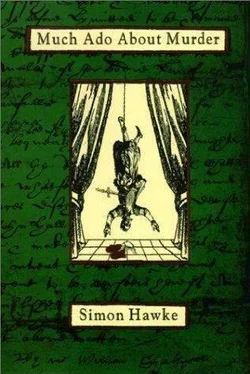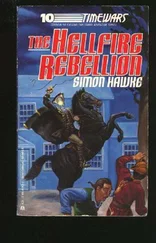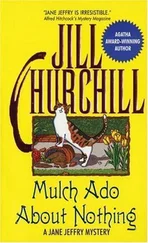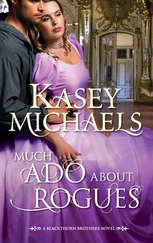Simon Hawke - Much Ado About Murder
Здесь есть возможность читать онлайн «Simon Hawke - Much Ado About Murder» весь текст электронной книги совершенно бесплатно (целиком полную версию без сокращений). В некоторых случаях можно слушать аудио, скачать через торрент в формате fb2 и присутствует краткое содержание. Жанр: Исторический детектив, на английском языке. Описание произведения, (предисловие) а так же отзывы посетителей доступны на портале библиотеки ЛибКат.
- Название:Much Ado About Murder
- Автор:
- Жанр:
- Год:неизвестен
- ISBN:нет данных
- Рейтинг книги:5 / 5. Голосов: 1
-
Избранное:Добавить в избранное
- Отзывы:
-
Ваша оценка:
- 100
- 1
- 2
- 3
- 4
- 5
Much Ado About Murder: краткое содержание, описание и аннотация
Предлагаем к чтению аннотацию, описание, краткое содержание или предисловие (зависит от того, что написал сам автор книги «Much Ado About Murder»). Если вы не нашли необходимую информацию о книге — напишите в комментариях, мы постараемся отыскать её.
Much Ado About Murder — читать онлайн бесплатно полную книгу (весь текст) целиком
Ниже представлен текст книги, разбитый по страницам. Система сохранения места последней прочитанной страницы, позволяет с удобством читать онлайн бесплатно книгу «Much Ado About Murder», без необходимости каждый раз заново искать на чём Вы остановились. Поставьте закладку, и сможете в любой момент перейти на страницу, на которой закончили чтение.
Интервал:
Закладка:
“I doubt that fortune has very much to do with it,” said Dickens. “I saw what you were doing there. You seem to know what you are about.”
“My Uncle Thomas was a smith. He taught me,” Smythe replied.
“I would say he taught you well,” said Dickens. “And I daresay he was more than just a smith. You were not forging horseshoes back there. You were working on a blade.”
“ ‘Twas his true passion,” Smythe replied, adding with pride, “and in the craftsmanship of blades, I never saw him have an equal. Truly, I would put his blades against the finest of Toledo.”
“Indeed? Thomas Smythe, you say? Mind you, now, I intend no offense toward you nor toward your uncle, but if his blades are truly of such superior craftsmanship, how is it I have never head of him?”
Smythe saw that the question came from curiosity, rather than from skepticism of his claim, so he did not take umbrage. “Our village was a small one,” he replied, “and no main thoroughfare ran through it. ‘Twas tucked away upon the boundary of a wood, and we received few visitors. When the players came through on tour once in my youth, ‘twas a momentous event. The arrival of each itinerant peddlar was regarded as a great occasion.” He smiled. “I recall how I used to dream of going to the city to become a player. Naught else did I desire. But not Uncle Thomas. He liked his quiet life. He is a simple man who keeps his own company and keeps it well. He works for the love of the craft, and the pride he takes in it, not for wealth nor fame. And if he had those things, why, I do not believe that he would quite know what to do with them.”
“Well, I should much like to see one of your uncle’s blades someday,” said Dickens.
“You might be disappointed,” Smythe replied. “They are rather plain and ordinary looking, not at all showy in appearance… but then again, as a soldier and one who was an armorer’s apprentice… Well, here then…” He unsheathed his simple knife. “He made this for me years ago, when I was just a boy. It bears his maker’s mark.”
Dickens took the knife and examined it. “It balances exceedingly well, and the design, while simple, looks quite strong.” He lightly tested the blade. “It holds a fine edge, too. Very fine, indeed.” He held it hilt downwards, point up alongside his inner forearm, as if concealing it, and then flipped it around in his grasp, blade held outward, ready to stab or throw. He turned it back around once more, holding his arm down by his side, to try the maneuver once again. It was, thought Smythe, a good way to carry a knife openly, yet unobtrusively, in the event that one expected trouble. Trust a mercenary, he thought, to know that sort of clever trick.
“ ‘Allo, Ben,” said Jack Darnley, suddenly stepping out in front of them from a side street. His fellow apprentice, Bruce McEnery, was right behind him.
“ ‘Allo, Jack,” said Dickens, coming to a halt. “I see you brought your ill-humored shadow with you,” he added, smirking at McEnery’s perpetual sneer.
“And I see you brought yours,” Darnley replied, with a smile. “Tuck is your friend’s name, if I recall aright.”
“It is,” said Smythe. “Tuck Smythe, at your service.”
“Fancy running into you again so soon, Jack,” Dickens said casually. “One might almost think ‘twas more than happenstance.”
“As well one might,” said Darnley. “We have been keeping an eye on you, you know.”
“Have you, now? And what would be the reason for such concern, I wonder?”
As Ben spoke, Smythe became aware of movement behind him. He glanced over his shoulder to see half a dozen apprentices spread out behind them. He groaned inwardly. What pernicious fortune had befallen him that it was the second time in as many days he was being accosted by a street gang? People around them in the street, seeing the congregation, gave them a wide berth, crossing over to the other side and hurrying past without a backward glance.
“We only wanted to make certain that you were all right, Ben,” Darnley replied.
“How very land of you and the boys, Jack. And tell me, what made you think that I might not be?”
“The city has changed whilst you have been away, Ben,” Darnley said. “ London is very different now. ‘Tis no longer the same place you remember from the old days.”
“Indeed? How very odd,” said Dickens. “Why, it still looks much the same to me. S’trewth, and it smells the same as I remember, too,” he added, wrinkling his nose. “The heady perfume of Fleet Ditch on the breeze is just as I recall it. Or mayhap ‘tis just the fragrance of unwashed ‘prentices upon the wind. What think you?”
“You may jest, Ben, but that does not change the truth of what I tell you,” Darnley said. “ London is now in many ways a different city than the one you left, and few of the changes have been for the better.”
“I have an intimation that you intend to educate me as to those changes, Jack,” said Dickens, with a smile.
“Indeed, methinks there is a need for it. You see, you left us, Ben, to go off adventuring and seek your fortune in some foreign land, whilst we all stayed here in London to make the best of things, because this is our home. Our home,” he repeated, thumping his chest for emphasis. “Our city.” He swept out his arm in an expansive gesture, encompassing all their surroundings. “Our streets. And yet, with each and every passing day, we have found our home invaded, as much as any conquering army might invade a country it has vanquished. Only this foreign army marched in piecemeal, coming in dribs and drabs… a few Flemish craftsmen here, some Italian merchants there, German traders, Egyptian fortune-tellers and the like, til now you can scarce spit on a street in London without hitting some damned foreigner. Take a look around you, Ben. On any day, a man can see countless good English working men and women out begging in the streets, desperate for a job, a warm place to sleep, a meager crust of bread with which to stave off hunger, and amongst them all go aloof Italian merchants in their silks, snobbish Flemish craftsmen in their three-piled velvet finery, arrogant German shopkeepers stuffed fat with ale and sausages, shifty gypsy moonmen ever ready to cozen some poor and honest working man out of the few brass farthings he has left. ‘Tis not the same city that you left at all, Ben. ‘Tis a city that the bloody damned foreigners are taking over. And someone has to stop it.”
“And that someone would be you?” said Dickens. “You and the Steady Boys, of course.”
“Who better?” Darnley asked. “They are driving our people out into the streets, Ben, leaving them homeless, starving, desperate. These damned foreigners should all go right back to where they came from!”
“And if they do not wish to go, why then, you shall drive them out, is that it?” Dickens said.
“Bloody right I will! Me and the boys. And what is more, the other ‘prentice gangs are all getting behind us in this venture!”
“Indeed? Well, then really I must congratulate you, Jack,” said Dickens. “You seem to haven taken a disorganized bunch of rakehell roaring boys who have all been at one another’s throats and given them a common enemy against whom to unite in opposition. ‘Tis an astonishing achievement, truly. And to think that I went abroad to learn the trade of soldiering whilst here you were all of this time, turning yourself into a general completely on your own. I doff my cap to you, Jack. I must say, I am full of admiration at what you have accomplished. Truly, I could not even imagine what a man of your inestimable abilities would ever want from me.”
“I want you to join us, Ben,” said Darnley, either ignoring Dickens’s sarcasm or else missing it completely. “ ‘Twould be just like the old days once again! You and me, leading the Steady Boys at the forefront of it all… Think of it! We could rouse all the ‘prentices in concert and clean out the vermin from this city! And you, as well, Tuck. You can be a part of it. The Steady Boys will always have a place for a strapping, big brawler like youself. Come and join us!”
Читать дальшеИнтервал:
Закладка:
Похожие книги на «Much Ado About Murder»
Представляем Вашему вниманию похожие книги на «Much Ado About Murder» списком для выбора. Мы отобрали схожую по названию и смыслу литературу в надежде предоставить читателям больше вариантов отыскать новые, интересные, ещё непрочитанные произведения.
Обсуждение, отзывы о книге «Much Ado About Murder» и просто собственные мнения читателей. Оставьте ваши комментарии, напишите, что Вы думаете о произведении, его смысле или главных героях. Укажите что конкретно понравилось, а что нет, и почему Вы так считаете.












